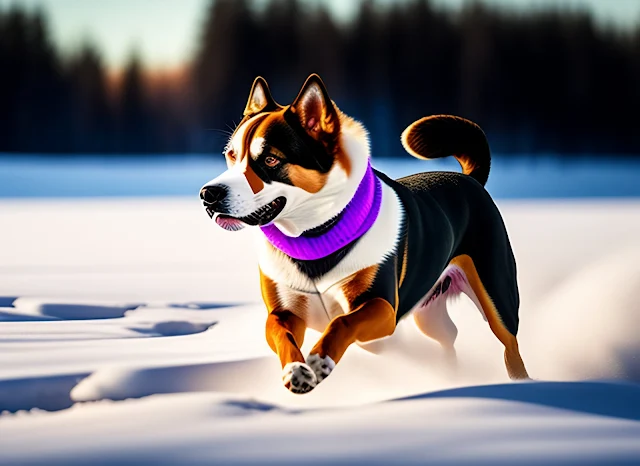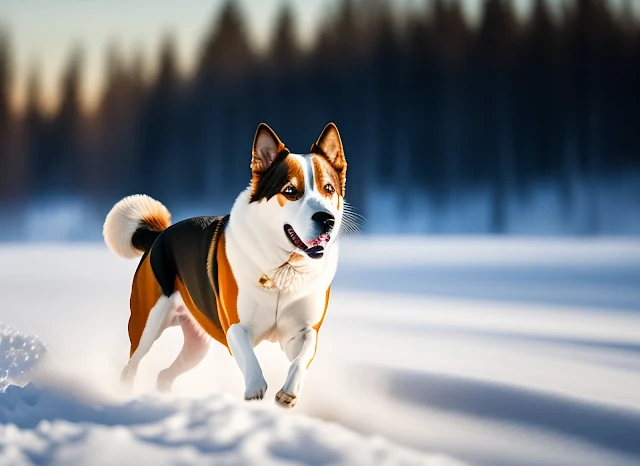Protect Your Dog's Joints This Winter: A Comprehensive Guide
Winter weather can be tough on our furry friends, especially when it comes to their joints. Cold temperatures, snow, and ice can all lead to joint pain and discomfort, making it difficult for them to move around and enjoy their usual activities. To help ensure that your dog stays happy and healthy this winter, it is important to understand the factors that contribute to joint problems and take steps to prevent them. In this comprehensive guide, we will provide you with everything you need to know about keeping your dog's joints healthy during the winter months.
Understanding the Effects of Cold Weather on Dog's Joints
Cold weather can have a major impact on your dog's joints, leading to stiffness, pain, and discomfort. This is because low temperatures cause the muscles and joints to contract, reducing blood flow and leading to pain and stiffness. Additionally, snow and ice can make it more difficult for your dog to move around, putting extra stress on their joints and increasing the risk of injury. To help prevent these problems, it is important to understand the effects of cold weather on your dog's joints and take measures to protect them.
Recognizing the Signs of Joint Problems in Dogs
To ensure that your dog stays healthy and happy, it is important to be aware of the signs of joint problems. Some of the most common signs of joint problems in dogs include:
- Limping or favoring one limb
- Reluctance to move or play
- Stiffness or difficulty getting up from a lying position
- Swelling or redness around the joints
- Reduced appetite and energy levels
If you notice any of these signs in your dog, it is important to seek veterinary care as soon as possible. Your veterinarian can provide a diagnosis and recommend a treatment plan that is tailored to your dog's individual needs.
Simple Steps to Keep Your Dog's Joints Healthy This Winter
There are several simple steps you can take to keep your dog's joints healthy this winter. Here are some tips to help you get started:
- Maintain a healthy weight: Excess weight can put extra stress on your dog's joints, increasing the risk of arthritis and other joint problems. Make sure your dog is at a healthy weight by feeding them a balanced diet and providing regular exercise.
- Keep your dog active: Regular exercise is essential for maintaining healthy joints. Provide your dog with plenty of opportunities for physical activity, such as walks, runs, and playtime.
- Provide warmth: Cold weather can be particularly challenging for dogs with joint problems. Provide your dog with a warm, comfortable place to sleep, and invest in a warm, waterproof coat for them to wear during walks.
- Use joint supplements: Joint supplements can help support the health of your dog's joints, reducing the risk of arthritis and other joint problems. Consult with your veterinarian to determine the best type of supplement for your dog.
- Seek veterinary care: If you notice any signs of joint problems in your dog, seek veterinary care as soon as possible. Your veterinarian can provide a diagnosis and recommend a treatment plan that is tailored to your dog's individual needs.
Additional Tips for Keeping Your Dog's Joints Healthy
In addition to the steps outlined above, there are several other things you can do to help keep your dog's joints healthy this winter. Here are a few additional tips to consider:
- Keep your home warm and dry: A warm, dry home can help reduce the risk of joint problems by providing your dog with a comfortable environment. Invest in a good quality heating system and make sure that your home is well-insulated.
- Avoid rough surfaces: Hard, rough surfaces like concrete and asphalt can put extra stress on your dog's joints, increasing the risk of injury. Provide a comfortable, soft surface for your dog to walk on, such as grass or soft ground.
- Massage and physical therapy: Massage and physical therapy can help improve circulation, reduce pain and stiffness, and support the health of your dog's joints. Talk to your veterinarian about the best type of massage or physical therapy for your dog.
- Invest in supportive gear: For dogs with joint problems, supportive gear like braces, slings, and shoes can provide extra support and help reduce the risk of injury. Talk to your veterinarian about the best type of gear for your dog.
- Hydrate: Staying hydrated is important for the health of your dog's joints. Make sure that your dog has access to fresh, clean water at all times, and consider adding a joint-supporting supplement to their diet.
By following these tips, you can help ensure that your dog stays happy and healthy this winter, and reduce the risk of joint problems. With proper care and attention, you can help your furry friend stay comfortable and active all year round.
Conclusion
Winter weather can be tough on our furry friends, especially when it comes to their joints. By understanding the effects of cold weather on your dog's joints, recognizing the signs of joint problems, and taking steps to prevent them, you can help ensure that your dog stays healthy and happy all winter long. Whether it's through regular exercise, the use of joint supplements, or the provision of a warm, comfortable environment, there are many simple steps you can take to protect your dog's joints this winter. So get started today, and enjoy many happy and healthy winters with your furry friend.
As the cold winter winds start to blow, are you prepared to protect your furry friend's joints? With joint problems affecting so many dogs, it's more important than ever to take action.
So don't wait until it's too late – take steps today to help your dog stay comfortable, active, and pain-free this winter. The future of your dog's joint health is in your hands – will you make the right choice? The answer is just a few simple steps away. So don't miss this opportunity to give your dog the gift of healthy joints.
Find out more now, and discover the secrets to keeping your dog's joints healthy this winter!




Join the conversation
What's your favorite way to incorporate healthy habits into your daily routine?